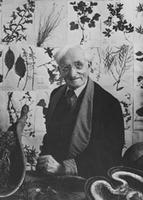
In 1908, President Theodore Roosevelt appointed a Commission on Country Life, with Liberty Hyde Bailey as its chair. Bailey described the country life movement as �the working out of the desire to make rural civilization as effective and satisfying as other civilization. � The Commission held thirty public hearings throughout the country, circulated over half a million brief questionnaires, and held numerous other meetings. Its report, edited by Bailey, was printed in 1911 and republished in 1944. The Commission offered three recommendations: a nationalized extension service, which was formalized by the passage of the Smith-Lever Act in 1914; continuing fact-finding surveys, fostering the development of agricultural economics and rural sociology in universities and the federal government; and a campaign for rural progress.
Bailey always saw agriculture as an academic discipline. To him, the fundamental purpose of education was to serve the people, and he believed that the resolution of agricultural problems was as important as cultural, ethical, and legal issues.
�I like the man who has an incomplete course�.If the man has acquired a power for work, a capacity for initiative and investigation, an enthusiasm for the daily life his incompleteness is his strength. How much there is before him! How eager his eyes! How enthusiastic his temper! He is a man with a point of view, not a man with mere facts. This man will see first big and significant things; he will grasp relationships; he will correlate; later he will consider the details.� � Liberty Hyde Bailey
(Photo-Liberty Hyde Bailey with Hortorium Specimens, 1949. Cornell University)









1 comment:
Interesting item
Of some note, there was actually a bit of a movement starting in the 1930s, during the Depression, to incorporate farms into the National life, if you will, as much as possible. The thought was that rural life was sterile, as farmers were so isolated. This was partially responsible for things like the REA, as it was hoped that electifying the farms would not only improve the life of the farmer, but also bring to him the preceived advantages of city life.
It is sort of an intersting topic, as while it had some merit as a movement, it was also accompanied, to a degree, by a certain contempt for farmers, who were viewed as backward. So, in bringing to the farm these convieniences, a subtle disapproval of rural life was also expressed. Some authors, such as Gene Logsdon and Wendell Berry, have commented on this attitude carrying forward in to current times.
Post a Comment